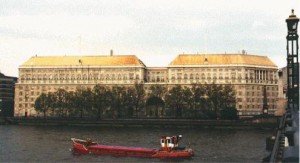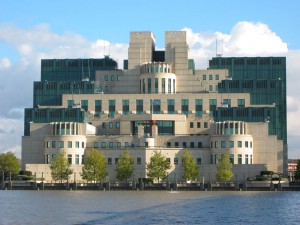Here is a taster of my recent interview on London Real TV. It was diverse, lively and fun, and should be broadcast in full tomorrow:
Annie Machon — Whistleblower — London Real TV from Annie Machon on Vimeo.
Here is a taster of my recent interview on London Real TV. It was diverse, lively and fun, and should be broadcast in full tomorrow:
Annie Machon — Whistleblower — London Real TV from Annie Machon on Vimeo.
Published on www.politics.co.uk, and Huffington Post UK.
Following the awful murder of Drummer Lee Rigby in Woolwich last week, the political securocrats who claim to represent the interests of the British intelligence services have swung into action, demanding yet further surveillance powers for MI5 and MI6 “in order to prevent future Woolwich-style attacks”.
As I’ve written before, it was heartening that the UK Prime Minister said in the aftermath of the attack that there would be no knee-jerk security reaction. However, that has not deterred certain intelligence sock-puppets from political opportunism — they stridently call for the resurrection of the draft Communications Data Bill that was earlier this year kicked into the long grass. If the hawks are successful, the new law would have implications not only for our freedoms at home, but also for our policy and standing abroad.
Recently the civil liberties camp acquired a surprising ally in this debate, with MI5 unexpectedly entering the fray. And rightly so. There is absolutely no need for this new legislation, the requisite powers are already in place. Senior security sources have argued that those citing the Woolwich attack to promote the snoopers’ charter are using a “cheap argument”.
As I said in this recent BBC radio interview, all the necessary laws are already in place for MI5 either to passively monitor or aggressively investigate persons of interest under the original terms of IOCA (1985) and updated in the Regulation of Investigatory Powers Act (RIPA 2000).
There now appears to be little doubt that the two Woolwich suspects were well and truly on the MI5 radar. It has been reported that they had been targets for at least 8 years and that Michael Adebolajo had been approached to work as an agent by MI5 as recently as 6 months ago.
One of his friends, Abu Nusaybah, recorded an interview for BBC’s Newsnight programme last week, only to be arrested by counter-terrorism police immediately afterwards. He stated that Adebolajo had been tortured and threatened with rape after his arrest in Kenya en route to Somalia, and that this treatment may have flipped him into more violent action. Indeed, the tale gets ever murkier, with reports yesterday stating that Adebolajo was snatched by the SAS in Kenya on the orders of MI5.
Other information has since been released by the organisation CagePrisoners indicating that Adebolajo’s family and friends had also been harrassed to pressurize him into reporting to MI5.
All of which obviates the early claims that Adebolajo was either a “lone wolf” or a low-priority target. It certainly indicates to me that MI5 will have at the very least been monitoring Adebolajo’s communications data, especially if they were trying to recruit him as a source. If that indeed turns out to have been the case, then without doubt MI5 will also have been intercepting the content of his communications, to understand his thinking and assess his access. Anything less would have been slipshod — a dereliction of duty — and all this could and should have been done under the existing terms of RIPA.
So what are the chances of some real oversight or answers?
If we’re talking about an independent inquiry, the chances are slim: the Inquiries Act (2005) passed little noticed into law, but it means that the government and the department under investigation can pretty much determine the scope and terms of the inquiry to which they are subject.
However, might we nail the flag of hope to the mast of the Intelligence and Security Committee of Parliament (ISC) — the committee tasked with overseeing the work of the UK intelligence agencies? The new DG of MI5, Andrew Parker, has already submitted a written report about Woolwich and will be giving evidence to the ISC in person next week about whether MI5 missed some vital intelligence or dropped the ball.
Th ISC of Parliament was established as part of the Intelligence Services Act (1994) — the law that finally brought MI6 and GCHQ under the umbrella of notional democratic oversight. MI5 had already come into the legal fold with the Security Service Act (1989).
As I have written before, initially the ISC was a democratic fig-leaf — its members were appointed by the PM not Parliament, it reported directly to the PM, and its remit only covered the policy, finance and administration of the UK’s intelligence agencies.
Until this year the ISC could not investigate operational matters, nor could it demand to see documents or question top spooks under oath. Indeed, it has been well reported that senior spies and police have long evaded meaningful scrutiny by being “economical with the truth”.
Former MI5 DG Sir Stephen Lander in 2001 said “I blanche at some of the things I declined to tell the committee early on”; a more recent DG, Sir Jonathan Evans, had to admit in 2008 that MI5 had lied about its involvement in torture; and Lord Blair, former Commissioner of the Metropolitan Police, had to apologise in 2008 for misleading the ISC about the number of thwarted terrorist attacks on his watch.
However the current Chair of the ISC, Sir Malcom Rifkind, has pursued a more muscular oversight role. And it seems he has at least won some battles. The one good element to have come out of the contentious Justice and Security Act (2013) appears to be that the ISC has more direct accountability to Parliament, rather than just to the PM (the devil is expressed in the detail: the ISC is now “of” Parliament, rather than “in” Parliament…).
Somewhat more pertinently, the ISC can now investigate operational matters, demand papers and witnesses, and it appears they now have a special investigator who can go and rummage around the MI5 Registry for information.
It remains to be seen how effective the ISC will realistically be in holding the intelligence agencies to account, even with these new powers. However, Sir Malcolm Rifkind has good reason to know how slippery the spies can be — after all, he was the Foreign Secretary in 1995/6, the years when MI6 was funding Al Qaeda associates to assassinate Colonel Gaddafi of Libya. The attack went wrong, innocent people were killed and, crucially, it was illegal under UK law, as MI6 had not requested the prior written permission for such a plot from the Foreign Secretary, as required under Section 7(1) of the aforementioned ISA (1994). Rifkind has always claimed that he was not told about the plot by MI6.
So, in the interests of justice let us hope that the Rifkind and the other members of the ISC fully exercise their powers and that MI5’s new DG, Andrew Parker is somewhat more frank about the work of his agency than his predecessors have been. It is only through greater honesty and accountability that our intelligence agencies can learn from the mistakes of the past and better protect our country in the future.
Yesterday I gave an interview to BBC Radio Ulster about the security fall-out of the Woolwich murder and the cynical political opportunism of those calling, inevitably, for greater powers for the spies and a reintroduction of the proposed Communuications Data Bill, dubbed the “snoopers’ charter”.
I’m gradually coming to after a knock-out blow last October — the unexpected death of my beloved and only brother, Rich. Words cannot describe.
But looking forward to the delights that 2012 will no doubt offer: Julian Assange remains trapped in a legal spider’s web, but all credit to Wikileaks — it keeps on providing the goods.
The recent publication of the SpyFiles should have been a massive wake-up call, as it it highlighted the increasing use and abuse of mercenary spy tech — all without any effective oversight, as I recently wrote in my article for the Bureau of Investigative Journalism.
Needless to say, the issue of massive commercial surveillance capabilities usually remains confined to a niche media market, although the Daily Mail did rouse itself to report that shoppers were being tracked via mobile phones as they consumed their way around malls. Well, I suppose it’s a start.
With the growth of mercenary spy companies in our minds, we should be even more concerned about the accelerated shredding of our civil liberties, particularly in the US and UK. Despite earlier promises that he would veto any such legislation, President Obama signed into law the invidious NDAA on 31st December. This means that the US military is now empowered to seize and indefinitely detain, with no recourse to traditional due process, not only potentially all non-Americans across the planet à la the Guantanamo/extraordinary rendition model, but can now also do this to US citizens within their own country.
 Despite the passionate internet debate, the issue has unsurprisingly been largely ignored by most of the mainstream corporate media. But the predominantly US-based internet commentary displays a breathtaking hypocrisy: yes, the NDAA is a terrible law with awful implications for American citizens. However, people around the world have been living with just this fear for a decade, with whole communities afraid of being snatched and disappeared into black CIA torture facilities. Where was the US outrage then? The Pastor Martin Niemoeller poem remains as relevant today as when it was written 70 years ago.
Despite the passionate internet debate, the issue has unsurprisingly been largely ignored by most of the mainstream corporate media. But the predominantly US-based internet commentary displays a breathtaking hypocrisy: yes, the NDAA is a terrible law with awful implications for American citizens. However, people around the world have been living with just this fear for a decade, with whole communities afraid of being snatched and disappeared into black CIA torture facilities. Where was the US outrage then? The Pastor Martin Niemoeller poem remains as relevant today as when it was written 70 years ago.
That said a couple of brave voices have spoken out: Naomi Wolf recently described how the US legislators could ironically find themselves on the receiving end of this law, if we go by all historic precedents. Paul Craig Roberts was on frothing good form too, inveighing against the war crimes of the US military, the persecution of Wikileaks for exposing those very crimes, and the evolving totalitarianism of our countries.
 In a digital mirror of the NDAA, the entertainment industry and their pet lobbyists are successfully ramming through the invidious SOPA law. As acclaimed digital rights activist and author, Cory Doctorow, described in his keynote at the recent CCC geekfest in Berlin, these ostensibly commercial laws are in effect a stalking horse for governments to seize control of the internet. As he wrote in the Guardian “you can’t make a system that prevents spying by secret police and allows spying by media giants”.
In a digital mirror of the NDAA, the entertainment industry and their pet lobbyists are successfully ramming through the invidious SOPA law. As acclaimed digital rights activist and author, Cory Doctorow, described in his keynote at the recent CCC geekfest in Berlin, these ostensibly commercial laws are in effect a stalking horse for governments to seize control of the internet. As he wrote in the Guardian “you can’t make a system that prevents spying by secret police and allows spying by media giants”.
With this in the back of our minds, the Wikileaks SpyFiles revelations about the increasing globalisation and commercialisation of corporate spy technology are even more alarming. The government spy agencies work with little effective oversight, but the mercenaries have a completely free legal rein. Intriguingly, it appears that unlike our own governments Afghanistan is alive to this problem and is reportedly booting out foreign contractors.
Yet the balance of power in certain western countries is sliding overwhelmingly towards police states — or, indeed, fascism, if you take into consideration Benito Mussolini’s definition: “the merger of state and corporate power”.
Our line of defence is slender — organisations like Wikileaks, one or two politicians of conscience, a few remaining real investigative journalists and perhaps the odd whistleblower. Beyond that, we must individually get to grips with the threat, get informed, teched up, and protect ourselves, as we can no longer rely on our governments to uphold our basic rights — you know, privacy, freedom of expression, habeas corpus, and all those other delightfully old-fashioned ideas.
If we do not act soon, we may no longer be able to act at all in the near future.… So I wish everyone an informed, productive and active 2012!
The Guardian’s spook commentator extraordinaire, Richard Norton-Taylor, has reported that the current chair of the Intelligence and Security Committee (ISC) in the UK Parliament, Sir Malcolm Rifkind, wants the committee to finally grow a pair. Well, those weren’t quite the words used in the Grauny, but they certainly capture the gist.
If Rifkind’s stated intentions are realised, the new-look ISC might well provide real, meaningful and democratic oversight for the first time in the 100-year history of the three key UK spy agencies — MI5, MI6, and GCHQ, not to mention the defence intelligence staff, the joint intelligence committee and the new National Security Council .
 For many long years I have been discussing the woeful lack of real democratic oversight for the UK spies. The privately-convened ISC, the democratic fig-leaf established under the aegis of the 1994 Intelligence Services Act (ISA), is appointed by and answerable only to the Prime Minister, with a remit only to look at finance, policy and administration, and without the power to demand documents or to cross-examine witnesses under oath. Its annual reports are always heavily redacted and have become a joke amongst journalists.
For many long years I have been discussing the woeful lack of real democratic oversight for the UK spies. The privately-convened ISC, the democratic fig-leaf established under the aegis of the 1994 Intelligence Services Act (ISA), is appointed by and answerable only to the Prime Minister, with a remit only to look at finance, policy and administration, and without the power to demand documents or to cross-examine witnesses under oath. Its annual reports are always heavily redacted and have become a joke amongst journalists.
When the remit of the ISC was being drawn up in the early 1990s, the spooks were apoplectic that Parliament should have any form of oversight whatsoever. From their perspective, it was bad enough at that point that the agencies were put on a legal footing for the first time. Spy thinking then ran pretty much along the lines of “why on earth should they be answerable to a bunch of here-today, gone-tomorrow politicians, who were leaky as hell and gossiped to journalists all the time”?
So it says a great deal that the spooks breathed a huge, collective sigh of relief when the ISC remit was finally enshrined in law in 1994. They really had nothing to worry about. I remember, I was there at the time.
This has been borne out over the last 17 years. Time and again the spies have got away with telling barefaced lies to the ISC. Or at the very least being “economical with the truth”, to use one of their favourite phrases. Former DG of MI5, Sir Stephen Lander, has publicly said that “I blanche at some of the things I declined to tell the committee [ISC] early on…”. Not to mention the outright lies told to the ISC over the years about issues like whistleblower testimony, torture, and counter-terrorism measures.
But these new developments became yet more fascinating to me when I read that the current Chair of the ISC proposing these reforms is no less than Sir Malcolm Rifkind, crusty Tory grandee and former Conservative Foreign Minister in the mid-1990s.
For Sir Malcolm was the Foreign Secretary notionally in charge of MI6 when the intelligence officers, PT16 and PT16/B, hatched the ill-judged Gaddafi Plot when MI6 funded a rag-tag group of Islamic extremist terrorists in Libya to assassinate the Colonel, the key disclosure made by David Shayler when he blew the whistle way back in the late 1990s.
Obviously this assassination attempt was highly reckless in a very volatile part of the world; obviously it was unethical, and many innocent people were murdered in the attack; and obviously it failed, leading to the shaky rapprochement with Gaddafi over the last decade. Yet now we are seeing the use of similar tactics in the current Libyan war (this time more openly) with MI6 officers being sent to help the rebels in Benghazi and our government openly and shamelessly calling for régime change.
 But most importantly from a legal perspective, in 1996 the “Gaddafi Plot” MI6 apparently did not apply for prior written permission from Rifkind — which they were legally obliged to do under the terms of the 1994 Intelligence Services Act (the very act that also established the ISC). This is the fabled, but real, “licence to kill” — Section 7 of the ISA — which provides immunity to MI6 officers for illegal acts committed abroad, if they have the requisite ministerial permission.
But most importantly from a legal perspective, in 1996 the “Gaddafi Plot” MI6 apparently did not apply for prior written permission from Rifkind — which they were legally obliged to do under the terms of the 1994 Intelligence Services Act (the very act that also established the ISC). This is the fabled, but real, “licence to kill” — Section 7 of the ISA — which provides immunity to MI6 officers for illegal acts committed abroad, if they have the requisite ministerial permission.
At the time, Rifkind publicly stated that he had not been approached by MI6 to sanction the plot when the BBC Panorama programme conducted a special investigation, screened on 7 August 1997. Rifkind’s statement was also reported widely in the press over the years, including this New Statesman article by Mark Thomas in 2002.
That said, Rifkind himself wrote earlier this year in The Telegraph that help should now be given to the Benghazi “rebels” — many of whom appear to be members of the very same group that tried to assassinate Gaddafi with MI6’s help in 1996 — up to and including the provision of arms. Rifkind’s view of the legalities now appear to be somewhat more flexible, whatever his stated position was back in the 90s.
Of course, then he was notionally in charge of MI6 and would have to take the rap for any political fall-out. Now he can relax into the role of “quis custodiet ipsos custodes?”. Such a relief.
I shall be watching developments around Rifkind’s proposed reforms with interest.
Here’s the text of an article I wrote for The Guardian a while ago, where I suggest we need a fresh perspective and some clear thinking on the role of the spies in the UK.
Worth reiterating, following the pre-emptive arrest of protesters:
 The cascade of revelations about secret policemen, starting with PC Mark Kennedy/environmental activist “Mark Stone”, has highlighted the identity crisis afflicting the British security establishment. Private undercover police units are having their James Bond moment – cider shaken, not stirred – while MI5 has become ever more plod-like, yet without the accompanying oversight. How has this happened to our democracy without any public debate?
The cascade of revelations about secret policemen, starting with PC Mark Kennedy/environmental activist “Mark Stone”, has highlighted the identity crisis afflicting the British security establishment. Private undercover police units are having their James Bond moment – cider shaken, not stirred – while MI5 has become ever more plod-like, yet without the accompanying oversight. How has this happened to our democracy without any public debate?
From the late 19th century the Metropolitan Police Special Branch investigated terrorism while MI5, established in 1909, was a counter-intelligence unit focusing on espionage and political “subversion”. The switch began in 1992 when Dame Stella Rimington, then head of MI5, effected a Whitehall coup and stole primacy for investigating Irish terrorism from the Met. As a result MI5 magically discovered that subversion was not such a threat after all – this revelation only three years after the Berlin Wall came down – and transferred all its staff over to the new, sexy counter-terrorism sections. Since then, MI5 has been eagerly building its counter-terrorism empire, despite this being more obviously evidential police work.
Special Branch was relegated to a supporting role, dabbling in organised crime and animal rights activists, but not terribly excited about either. Its prestige had been seriously tarnished. It also had a group of experienced undercover cops – known then as the Special Duties Section – with time on their hands.
 It should therefore come as little surprise that Acpo, the private limited company comprising senior police officers across the country, came up with the brilliant idea of using this skill-set against UK “domestic extremists”. Acpo set up the National Public Order Intelligence Unit (NPOIU). This first focused primarily on animal rights activists, but mission creep rapidly set in and the unit’s role expanded into peaceful protest groups. When this unaccountable, Stasi-like unit was revealed it rightly caused an outcry, especially as the term “domestic extremist” is not recognised under UK law, and cannot legally be used as justification to aggressively invade an individual’s privacy because of their legitimate political beliefs and activism. So, plod has become increasingly spooky. What of the spooks?
It should therefore come as little surprise that Acpo, the private limited company comprising senior police officers across the country, came up with the brilliant idea of using this skill-set against UK “domestic extremists”. Acpo set up the National Public Order Intelligence Unit (NPOIU). This first focused primarily on animal rights activists, but mission creep rapidly set in and the unit’s role expanded into peaceful protest groups. When this unaccountable, Stasi-like unit was revealed it rightly caused an outcry, especially as the term “domestic extremist” is not recognised under UK law, and cannot legally be used as justification to aggressively invade an individual’s privacy because of their legitimate political beliefs and activism. So, plod has become increasingly spooky. What of the spooks?
As I mentioned, they have been aggressively hoovering up the prestigious counter-terrorism work. But, despite what the Americans have hysterically asserted since 9/11, terrorism is not some unique form of “eviltude”. It is a crime – a hideous, shocking one, but still a crime that should be investigated, with evidence gathered, due process applied and the suspects on trial in front of a jury.
A mature democracy that respects human rights and the rule of law should not intern suspects or render them to secret prisons and torture them for years. And yet this is precisely what our spooks are now allegedly doing – particularly when colluding with their US counterparts.
Also, MI5 and MI6 operate outside any realistic democratic oversight and control. The remit of the intelligence and security committee in parliament only covers the policy, administration and finance of the spies. Since the committee’s inception in 1994 it has repeatedly failed to meaningfully address more serious questions about the spies’ role. The spooks are effectively above the law, while at the same time protected by the draconian Official Secrets Act. This makes the abuses of the NPOIU seem almost quaint. So what to do? A good first step might be to have an informed discussion about the realistic threats to the UK. The police and spies huddle behind the protective phrase “national security”. But what does this mean?
 The core idea should be safeguarding the nation’s integrity. A group of well-meaning environmental protesters should not even be on the radar. And, no matter how awful, the occasional terrorist attack is not an existential threat to the fabric of the nation in the way of, say, the planned Nazi invasion in 1940. Nor is it even close to the sustained bombing of government, infrastructure and military targets by the Provisional IRA in the 70s-90s.
The core idea should be safeguarding the nation’s integrity. A group of well-meaning environmental protesters should not even be on the radar. And, no matter how awful, the occasional terrorist attack is not an existential threat to the fabric of the nation in the way of, say, the planned Nazi invasion in 1940. Nor is it even close to the sustained bombing of government, infrastructure and military targets by the Provisional IRA in the 70s-90s.
Once we understand the real threats, we as a nation can discuss the steps to take to protect ourselves; what measures should be taken and what liberties occasionally and legally compromised, and what democratic accountability exists to ensure that the security forces do not exceed their remit and work within the law.
 Here’s a link to my article in The Guardian today, exploring the confused roles of modern British spies, and looking at some ways to sort out the mess. Both the police and the spooks seem to be having a bit of an identity crisis at the moment…
Here’s a link to my article in The Guardian today, exploring the confused roles of modern British spies, and looking at some ways to sort out the mess. Both the police and the spooks seem to be having a bit of an identity crisis at the moment…
Are environmental activists really a spying priority?
Revelations about policemen spying on environmental activists suggest we need a sense of perspective on threats to the nation.
The cascade of revelations about secret policemen, starting with PC Mark Kennedy/environmental activist “Mark Stone”, has highlighted the identity crisis afflicting the British security establishment. Private undercover police units are having their James Bond moment – cider shaken, not stirred – while MI5 has become ever more plod-like, yet without the accompanying oversight. How has this happened to our democracy without any public debate?
From the late 19th century the Metropolitan Police Special Branch investigated terrorism while MI5, established in 1909, was a counter-intelligence unit focusing on espionage and political “subversion”. The switch began in 1992 when Dame Stella Rimington, then head of MI5, effected a Whitehall coup and stole primacy for investigating Irish terrorism from the Met. As a result MI5 magically discovered that subversion was not such a threat after all – this revelation only three years after the Berlin Wall came down – and transferred all its staff over to the new, sexy counter-terrorism sections. Since then, MI5 has been eagerly building its counter-terrorism empire, despite this being more obviously evidential police work.
Special Branch was relegated to a supporting role, dabbling in organised crime and animal rights activists, but not terribly excited about either. Its prestige had been seriously tarnished. It also had a group of experienced undercover cops – known then as the Special Duties Section – with time on their hands.
It should therefore come as little surprise that Acpo, the private limited company comprising senior police officers across the country, came up with the brilliant idea of using this skill-set against UK “domestic extremists”. Acpo set up the National Public Order Intelligence Unit (NPOIU). This first focused primarily on animal rights activists, but mission creep rapidly set in and the unit’s role expanded into peaceful protest groups. When this unaccountable, Stasi-like unit was revealed it rightly caused an outcry, especially as the term “domestic extremist” is not recognised under UK law, and cannot legally be used as justification to aggressively invade an individual’s privacy because of their legitimate political beliefs and activism. So, plod has become increasingly spooky. What of the spooks?
As I mentioned, they have been aggressively hoovering up the prestigious counter-terrorism work. But, despite what the Americans have hysterically asserted since 9/11, terrorism is not some unique form of “eviltude”. It is a crime – a hideous, shocking one, but still a crime that should be investigated, with evidence gathered, due process applied and the suspects on trial in front of a jury.
A mature democracy that respects human rights and the rule of law should not intern suspects or render them to secret prisons and torture them for years. And yet this is precisely what our spooks are now allegedly doing – particularly when colluding with their US counterparts.
Also, MI5 and MI6 operate outside any realistic democratic oversight and control. The remit of the intelligence and security committee in parliament only covers the policy, administration and finance of the spies. Since the committee’s inception in 1994 it has repeatedly failed to meaningfully address more serious questions about the spies’ role. The spooks are effectively above the law, while at the same time protected by the draconian Official Secrets Act. This makes the abuses of the NPOIU seem almost quaint. So what to do? A good first step might be to have an informed discussion about the realistic threats to the UK. The police and spies huddle behind the protective phrase “national security”. But what does this mean?
The core idea should be safeguarding the nation’s integrity. A group of well-meaning environmental protesters should not even be on the radar. And, no matter how awful, the occasional terrorist attack is not an existential threat to the fabric of the nation in the way of, say, the planned Nazi invasion in 1940. Nor is it even close to the sustained bombing of government, infrastructure and military targets by the Provisional IRA in the 70s-90s.
Once we understand the real threats, we as a nation can discuss the steps to take to protect ourselves; what measures should be taken and what liberties occasionally and legally compromised, and what democratic accountability exists to ensure that the security forces do not exceed their remit and work within the law.
 I wonder what information, if any, MI5 has on file about new-ish UK Home Secretary, Alan Johnson? Or, more pertinently, what HE thinks the spies might have.…..
I wonder what information, if any, MI5 has on file about new-ish UK Home Secretary, Alan Johnson? Or, more pertinently, what HE thinks the spies might have.…..
How else explain his recent comments in The Daily Torygraph? He said that he will be the voice of those who cannot defend themselves — ie those poor, anonymous intelligence officers in MI5. He even drags out the hoary old chestnut that a criminal investigation into prima facie evidence that the spooks have been involved in serious crime — the torture of another human being — would damage national security.
I’m surprised he managed to bite back Tony Blair’s infamous line, that an investigation into possible spy incompetence and crime would be a “ludicrous diversion”
Ever since Labour came to power in 1997, we have had a series of Home Secretaries straining to avoid doing their job vis a vis the spooks in Thames House: the job being that of political master of MI5, thereby providing a modicum of democratic oversight to an extremely powerful and secretive organisation, holding it to account and ensuring it obeys the law.
The role of Home Secretary is not to be the champion of unaccountable spies who are protected from investigation and oversight by a whole raft of secrecy legislation.
More and more evidence is emerging that MI5 assisted the USA’s extraordinary rendition plan, that it was complicit in torture, and that its officers have lied to cover their tracks. Under this avalanche of scandal, some MPs have finally woken up to the fact that the Home Secretary should be ensuring MI5 obeys the law. Some are even daringly suggesting that there should be proper Parliamentary oversight of the spies, rather than the fig leaf that is the Intelligence and Security Committee — hand-picked by and only answerable to the Prime Minister, and powerless to question intelligence officers under oath, demand papers, or look at anything more serious than policy, finance or administration.
 The Metropolitan Police have even begun a criminal investigation into MI5’s complicity in torture. While I doubt any case that could, ahem, “damage national security” will ever come to court, a few junior officers may be asked to do the decent thing and quietly walk the plank.
The Metropolitan Police have even begun a criminal investigation into MI5’s complicity in torture. While I doubt any case that could, ahem, “damage national security” will ever come to court, a few junior officers may be asked to do the decent thing and quietly walk the plank.
But the real issue — the closed, self-perpetuating group-think culture, where officers should just follow orders and not rock the boat — will continue unchallenged, resulting inevitably in yet more scandals.
It is time we had a Home Secretary who is up to the job and who has the backbone to initiate some meaningful reform of MI5.
A debate is currently under way in the (ex) Land of the Free about how much protection intelligence whistleblowers should be accorded under the law.
Yes, the country that has brought the world the “war on terror”, Guantanamo Bay, and the Patriot Act, is having a moral spasm about how to best protect those who witness high crimes and misdemeanors inside the charmed circle of secrecy and intelligence.
And about time too, following the mess of revelations about spy complicity in torture currently emerging on both sides of the pond.
Interestingly, intelligence officials in the US already have a smidgeon more leeway than their UK counterparts. In the US, if you witness a crime committed by spies, you have to take your concerns to the head of the agency, and then you can go to Congress. In the UK, the only person you can legally report crime to is the head of the agency involved, so guess how many successful complaints are made? Even taking your proven and legitimate concerns to your elected UK representatives is a crime under the OSA.
Spooks in the UK now have access to an “ethical counsellor”, who has reportedly been visited a grand total of 12 times by intelligence officers since 2006. But this person has no power to investigate allegations of crime, and a visit guarantees a career-blocking black mark on your record of service: ie if you are the sort of person to worry your head with quaint ideas like ethics and morality you are, at best, not a team player and, worse, a possible security risk.
 This is surely culturally unsustainable in a community of people who generally sign up to protect the citizens of the country and want to make a positive difference by working within the law? Those who have concerns will resign, at the very least, and those who like to “just follow orders” will float to the top. As one of the leading proponents for greater whistleblower protection in the USA states in the linked article:
This is surely culturally unsustainable in a community of people who generally sign up to protect the citizens of the country and want to make a positive difference by working within the law? Those who have concerns will resign, at the very least, and those who like to “just follow orders” will float to the top. As one of the leading proponents for greater whistleblower protection in the USA states in the linked article:
“The code of loyalty to the chain of command is the primary value at those institutions, and they set the standard for intensity of retaliation.”
Some enlightened US politicians appear to be aware that intelligence whistleblowers require protection just as all other employees receive under the law: perhaps more so, as the nature of their work may well expose them to the most heinous crimes imaginable. There is also an argument for putting proper channels in place to ensure that whistleblowers don’t feel their only option is to risk going to the press. Effective channels for blowing the whistle and investigating crime can actually protect national security rather than compromise it.
The nay-sayers, of course, want to keep everything secret — after all, the status quo is currently working so well in upholding democratic values across the globe. Critics of the new legislation talk of “disgruntled employees .… gleefully” spilling the beans. Why is this hoary old line always dragged out in this type of discussion? Why are whistleblowers always described in this way, rather than called principled, brave or ethical?
Blanket secrecy works against the real interests of our countries. Mistakes can be covered up, group-think ensures that crimes continue, and anyone offering constructive criticism is labelled as a risky troublemaker — no doubt a “disgruntled” one at that.
Of course, certain areas of intelligence work need to be protected: current operational details (as ex-Met Assistant Commissioner, Bob Quick has discovered), agent identities, and sensitive techniques. But the life blood of a healthy democracy depends on open debate, ventilation of problems, and agreed solutions. Informed and participatory citizens need to know what is being done in their name.
 Leading UK human rights lawyer, Gareth Peirce, has written a powerful and eloquent article in the London Review of Books about the British state’s involvement in torture.
Leading UK human rights lawyer, Gareth Peirce, has written a powerful and eloquent article in the London Review of Books about the British state’s involvement in torture.
She also broadens out the argument to look at the fundamental societal problems — lack of accountability, secrecy, the use and abuse of the concept of “national security” — that created a culture that facilitates and condones torture.
Gareth has fought for victims of injustice for four decades, focusing primarily on terrorism and intelligence issues.
A long piece, but stick with. It’s worth it!
The lack of any meaningful oversight of the UK’s intelligence community was highlighted again last week, when The Daily Mail reported that a crucial fax was lost in the run-up to the 7/7 bombings in London in 2005.
There has yet to be an official enquiry into the worst terrorist atrocity on the UK mainland, despite the call for one from traumatised families and survivors and the legitimate concerns of the British public. To date, we have had to make do with an “official narrative” written by a faceless bureaucrat and published in May 2006. As soon as it was published, the then Home Secretary, John Reid, had to correct egregious factual errors when presenting it to Parliament.
The Intelligence and Security Committee (ISC) also did a shoddy first job, when it cleared the security forces of all wrong-doing in its initial report published at the same time. It claimed a lack of resources had hampered MI5’s counter-terrorism efforts.
However, following a useful leak, it emerged that MI5 had not only been aware of at least two of the alleged bombers before the attack, it had been concerned enough to send a fax up to West Yorkshire Police Special Branch asking them to investigate Mohammed Sidique Khan and Shehzad Tanweer. This fax was never acted upon.
So the ISC has been forced to produce another report, this time apparently admitting that, yes, there had been intelligence failures, most notably the lost fax. West Yorkshire SB should have acted on it. But the intelligence officer in MI5 responsible for this investigation should have chased it up when no response was forthcoming.
This second ISC report, which has been sitting on the Prime Minister’s desk for weeks already, is said to be “devastating”. However, I’m willing to bet that if/when it sees the light of day, it will be anything but.
 The ISC is at best an oversight fig leaf. It was formed in 1994, when MI6 and GCHQ were put on a statutory footing for the first time with the Intelligence Services Act. At the time the press welcomed this as a great step forward towards democratic accountability for the intelligence community. Well, it could not have been worse than the previous set-up, when MI5, MI6 and GCHQ did not officially exist. They were not required to obey the laws of the land, and no MP was allowed to ask a question in Parliament about their activities. As 1980s whistleblower Peter Wright so succinctly put it, the spies could bug and burgle their way around with impunity.
The ISC is at best an oversight fig leaf. It was formed in 1994, when MI6 and GCHQ were put on a statutory footing for the first time with the Intelligence Services Act. At the time the press welcomed this as a great step forward towards democratic accountability for the intelligence community. Well, it could not have been worse than the previous set-up, when MI5, MI6 and GCHQ did not officially exist. They were not required to obey the laws of the land, and no MP was allowed to ask a question in Parliament about their activities. As 1980s whistleblower Peter Wright so succinctly put it, the spies could bug and burgle their way around with impunity.
So the establishment of the ISC was a (very) limited step in the right direction. However, it is not a Parliamentary Committee. Its members are selected by the Prime Minister, and it is answerable only to the PM, who can vet its findings. The remit of the ISC only covers matters of spy policy, administration and finance. It is not empowered to investigate allegations of operational incompetence nor crimes committed by the spies. And its annual report has become a joke within the media, as there are usually more redactions than coherent sentences.
The ISC’s first big test came in the 1990s following the Shayler and Tomlinson disclosures. These involved detailed allegations of illegal investigations, bungled operations and assassination attempts against foreign heads of state. It is difficult to conceive of more heinous crimes committed by our shadowy spies.
But how did the ISC react? If one reads the reports from the relevant years, the only aspect that exercised the ISC was Shayler’s information that MI5 had on many MPs and government ministers. The ISC was reassured by MI5 that would no longer be able to use these files. That’s it.
Forget about files being illegally held on hundreds of thousands of innocent UK citizens; forget about the illegal phone taps, the preventable deaths on UK streets from IRA bombs, innocent people being thrown in prison, and the assassination attempt against Colonel Gaddafi of Libya. The fearless and eternally vigilant ISC MPs were primarily concerned about receiving reassurance that their files would no longer be vetted by MI5 officers on the basis of membership to “subversive” organisations. What were they afraid of – that shameful evidence of early left-wing activity from their fiery youth might emerge? Heaven forbid under New Labour.
Barely a day goes by when newspaper headlines do not remind us of terrible threats to our national security. Only in the last week, the UK media has reported that the threat of espionage from Russia and China is at its highest since the days of the Cold War; that resurgent Republican terror groups in Northern Ireland pose a graver danger to us even than Al Qaeda; that radicalised British Muslim youth are returning from fighting with the Taliban to wage war on the streets of the UK. We have to take all this on trust, despite the intelligence community’s appalling track record of bending the truth to gain more powers and resources. This is why meaningful oversight is so vitally important for the health of our democracy. The ISC is a long way from providing that.
For context, here’s a little bit of background information about the UK’s spy agencies, and the legal constraints within which they are supposed to operate.
 There are three primary agencies: MI5 (the UK Security Service), MI6 (Secret Intelligence Service — SIS) and GCHQ (the Government Communications HQ). Beyond this inner circle, there is the Metropolitan Police Special Branch (MPSB), the special branches of every other police force in the UK, military intelligence, and Customs, amongst others.
There are three primary agencies: MI5 (the UK Security Service), MI6 (Secret Intelligence Service — SIS) and GCHQ (the Government Communications HQ). Beyond this inner circle, there is the Metropolitan Police Special Branch (MPSB), the special branches of every other police force in the UK, military intelligence, and Customs, amongst others.
MI5 and MI6 were set up in 1909 during the build up to the First World War, when their remit was to uncover German spies. For the next 80 years they didn’t officially exist and operated outside the law.
In 1989 MI5 was put on a legal footing for the first time when parliament passed the Security Service Act. This stated that it had to work within legal parameters, and if it wanted to do something that would otherwise be illegal, such as breaking into and bugging someone’s house, it had to get the written permission of its political master, the Home Secretary. Without that, MI5 would be breaking the law just as you or I would be.
MI6 and GCHQ were not put on a legal footing until the 1994 Intelligence Services Act, and are answerable to the Foreign Secretary. The same Act also set up the Intelligence and Security Committee in Parliament as a sop to democratic oversight. The ISC is responsible for overseeing the policy, finance and administration of the three agencies. It has absolutely no remit to look at their operational running, nor can it investigate alleged crimes committed by them. Even if it could, the ISC has no power to call for witnesses or demand documents from the spooks. Moreover, the committee is appointed by the Prime Minister, answerable only to him, and he can vet its findings. Much of the ISC’s annual reports are blanked out.
 When I was recruited by MI5 in the early 1990s, the organisation was at great pains to explain that it worked within the law, was accountable, and its work was mainly investigating terrorism. Once I began working there, this quickly proved to be untrue. MI5 is incompetent, it breaks the law, connives at the imprisonment of innocent people, illegally bugs people, lies to government (on whom it holds personal files) and turns a blind eye to false flag terrorism. This is why I resigned and helped to blow the whistle.
When I was recruited by MI5 in the early 1990s, the organisation was at great pains to explain that it worked within the law, was accountable, and its work was mainly investigating terrorism. Once I began working there, this quickly proved to be untrue. MI5 is incompetent, it breaks the law, connives at the imprisonment of innocent people, illegally bugs people, lies to government (on whom it holds personal files) and turns a blind eye to false flag terrorism. This is why I resigned and helped to blow the whistle.
With all this hysteria about the threat from Al Qaeda, and the avalanche of new powers and resources being thrown at the spooks, as well the erosion of our liberties, we need to keep a cool head. Why don’t our politicians take a step back and ask what precisely are the scale and nature of the threats facing this country, and how can we best police them? As Sir Ian Blair recently showed, we cannot take the security forces’ words about this at face value.
There’s a lot of historic baggage attached to MI5 and 6, particularly after their dirty tricks against the left in the 1980s. As they are now primarily doing a policing job against terrorism, why not just clear the decks and start again? Set up a dedicated counter-terrorism agency, which is properly accountable to parliament, as the police already are and the spies are not.
As it stands the UK has the most secretive intelligence agencies in the western world. They are exempt from the Freedom of Information Act, and protected by the draconian Official Secrets Act. The 1989 OSA makes it a criminal offence for anyone to blow the whistle on crimes committed by the spies, and it is no longer possible for a whistleblower to argue that they acted in the public interest.
No other western democracy has spies who are quite so unaccountable, nor so protected from scrutiny by the law. The closest analogies are probably the intelligence agencies of countries such as Libya or Iran. Particularly as we now know that MI5 and MI6 officers are conniving in extraordinary rendition and the use of torture.
Are they legal? Yes, now, in theory. Do they abide by the law? Only when it suits them. Are they ethical? Absolutely not.
An interesting article appeared in The Sunday Times today, stating that Britain’s top policeman, the Commissioner of the Metropolitan Police Sir Ian Blair, had “unwittingly” misled the parliamentary Intelligence and Security Committee about the need to increase the period of detention without charge for terrorist suspects in the UK from 28 to 42 days. Blair claimed that 12 major terrorist operations had been foiled in Britain since 2005. In fact, the article reports that only 6 plots have been stopped. Blair has had to issue a grovelling apology via the Press Association for this, umm, gaffe.
But the article neglects to tell us how and why this new information came to light. So allow me to speculate.
The Met, along with its shadowy cohorts in MI5, is entrusted with protecting Britain from terrorist threats. Since 9/11 and the all-pervasive war on terror, Britain’s security forces have been granted sweeping new powers, resources and a huge increase in staffing levels to do this job. To ensure this is justified, they are continually telling us of the huge threat we face from terrorism and how successful they are in protecting us. It is in their interests to talk this up.
 Meanwhile, over on the south bank of the river, MI6 continues to suffer from the loss of prestige brought about by its mistakes and lack of good intelligence in the run-up to the Iraq invasion. There is no love lost between these three agencies, as they compete for power and resources. So, to use a good civil service phrase, I cannot rule out the possibility that someone in MI6 leaked this information to have a pop at the Met and MI5.
Meanwhile, over on the south bank of the river, MI6 continues to suffer from the loss of prestige brought about by its mistakes and lack of good intelligence in the run-up to the Iraq invasion. There is no love lost between these three agencies, as they compete for power and resources. So, to use a good civil service phrase, I cannot rule out the possibility that someone in MI6 leaked this information to have a pop at the Met and MI5.
However, there is a more serious aspect to this incident. But for this information emerging, MPs and public alike would have had no way of knowing that the perceived threat from terrorism had been grossly inflated in order for the police to gain yet more powers. We would have had to take Sir Ian’s word.
Well, we’ve been here before many, many times, most notoriously when the intelligence agencies would have us believe that Saddam had WMD that could attack British interests with 45 minutes. This, of course, led to the Iraq war and the deaths of hundreds of thousands of innocent men, women and children.
So how can we ensure we are told the truth by the spies? Well, greater accountability and effective parliamentary oversight would be a step in the right direction. But we don’t just need the correct mechanisms in place in parliament. We also need MPs with the knowledge, intelligence and integrity to ask the difficult questions when faced with bogus assertions.
